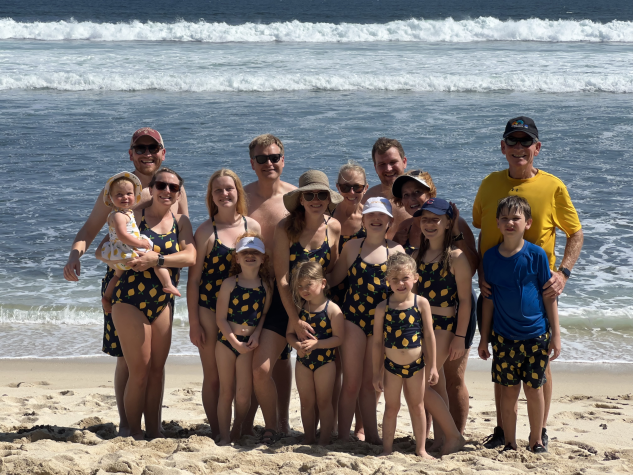Alumnus Jay Love (Butler) Serves in the Light of Truth with a Heart for Non-Profit Leadership
 After four decades in the non-profit and charitable sector, technology entrepreneur Jay Love (Butler University) is considering a third attempt at retiring.
After four decades in the non-profit and charitable sector, technology entrepreneur Jay Love (Butler University) is considering a third attempt at retiring.
"Who wouldn't want to retire," he says with a laugh.
However, Love's drive to make meaningful impacts in the lives of others may put that goal on hold.
"Every time I try to retire, I keep coming up with additional business ideas and opportunities," said Love, who divides his time between homes in Indiana and Florida. "And honestly, once it's in your blood to help other people, it's hard to leave."
Love founded the fundraising platform eTapestry in 1999 after a long career in computer sales and technology. He and three partners introduced the first web-based product specifically designed for non-profit organizations.
After 11 years, Love sold eTapestry, retired, then launched Bloomerang in 2012 as a donor management platform for non-profit organizations.
Although now formally retired from Bloomerang, he retains his title as chief relationship officer and member of the board of directors, as well as a sought-after consultant and speaker on the intersection of non-profits and technology.
"A big part of my heart and soul is about the non-profit world and what we can do to help, especially the small to medium size ones," Love said. "That's always been a big part of my world."
After a career spanning 40 years and the successful launch of two companies, Love can't imagine life without opportunities to do good for others. While his companies helped support and grow non-profit organizations, Love and his wife, Christie Kile Love, have quietly and personally done the same. They strongly support about a dozen charitable organizations and regularly donate to countless others.
Most recently, the Loves, who are the parents of three children, donated $4 million to their alma mater, Butler University in Indianapolis, to build a new residence for the school's president. The Jay and Christie Kile Love University House will serve as both a home for future Butler presidents and a venue for hosting fundraising and other community events.
The Foundation of a Servant's Heart
Love grew up in tiny Gaston, Indiana, just outside Muncie, Indiana. A small farming community back in the 1970s when he grew up, the town still has fewer than 1,000 residents.
Love excelled in academics in high school and earned a full scholarship to any college in the country. While the lights of Stanford and Yale may have burned brightly, Love chose to attend Butler University, about an hour away from Gaston. For him, that was the big city – plus, his cousin had played basketball for Butler, so it was family.
"I thought, well, Stanford and some of these other places sound great, but that's a long way from home for this small town boy," Love said.
He packed up his old Camaro, waved goodbye to his parents, and blasted the stereo all the way to Indianapolis.
"I was the first to go to college in my family…and my parents didn't even help me move in," he said, laughing at the memory of life on his own. "I drove down by myself, moved into my room, and just started trying to meet people."
His initial career goal was to become a pharmacist. That lasted about one semester when he realized that career track was not where his talents or interests were. By then, he was active in Sigma Nu Fraternity, meeting people from all over the country and awakening the extrovert within him.
"I had a professor who said I had a knack for business and asked if I really wanted to spend all my time in the lab," Love said of his "come to career" moment. "I said 'no,' switched over to the business department…and never looked back."
After graduation, he found a job in Indianapolis selling business computers. Through an acquaintance, Love was introduced to the world of non-profit organizations and saw these groups' challenges in managing databases, accounting, and information.
"All the fundraising records were kept on three by five cards, stored in boxes…and the records were never very good," Love said. "There was just no science to the process."
Few non-profits, especially the small, local ones, could afford the computers currently on the market. That changed in 1981 with the release of the IBM personal computer.
 While in his first job, Love learned of a small company in Indianapolis that created the first "all in one" computer program specifically for non-profits to manage record keeping. Love knew he wanted to be a part of it that company.
While in his first job, Love learned of a small company in Indianapolis that created the first "all in one" computer program specifically for non-profits to manage record keeping. Love knew he wanted to be a part of it that company.
"It took me three months to convince them to hire me," Love said, primarily because the small company could not afford another employee. "But once I got there, it was a perfect match."
He enjoyed interacting with professional fundraisers and being a part of helping organizations achieve their missions. Before his arrival, the company was selling about five programs a month.
"Within six months, we were selling 20 to 30 programs a month and were off and running," Love said.
Giving to others is a family venture. His wife, Christie, has a long career in education and non-profit management, both as a teacher and as the former Executive Director of the Lawrence Township (Indianapolis) School Foundation.
"My wife has become a professional fundraiser…raising money for after-school programs, additional learning programs, and funding various programs that government funding does not provide," Love said. "I am living alongside someone whose entire life is [non-profit work]."
Finding the Silver Bullet
In 1999, Love founded eTapestry, revolutionizing fundraising and donor relationships for non-profits and charitable organizations. The company built a platform to support cloud-based transactions, which could easily and efficiently track and manage donors and donations.
It was a game changer for the non-profit sector, and the company grew and prospered under Love's leadership and vision. When he sold the company in 2007, Love had the opportunity to retire – for the first time.
"There was a six-month period where I toyed with retirement …played a lot of golf and did a lot of things," Love said, noting he remained active on numerous non-profit committees and boards. "Then I decided I was way too young to do that."
The idea for his second business venture, Bloomerang, came from a conference he attended for national non-profit organizations where the keynote speaker discussed the challenges of donor retention.
"As I listened, I thought that I could make a difference," Love said. "This is the magic silver bullet I've been waiting for."
He knew if he could create a program to make the one-time donor a repeating donor, it would provide the lifeblood for the organization. Even a one to two percent rise in retention each year would be significant.
"The typical commercial business retains customers somewhere between 90 and 95 percent," Love said. "But for a typical non-profit, the average donor retention is somewhere under 50 percent."
Bloomerang launched in 2012 with a multi-tier approach to donor retention management. The platform provides information on identifying, motivating, and retaining donors through a variety of measurements. This allows the organization to determine best practices moving forward.
"Before Bloomerang, there was no easy way for any non-profit to find out exactly what their donor retention was," Love explained. "It's a basic formula, but it's also complicated."
He said the program took off as word spread about its results. Today thousands of customers are using Bloomerang.
In 2019, Love co-founded The Fundraising Standard, a 40-hour online program designed to introduce participants to the fundraising process. And despite being technically retired, he is mulling over his next business venture.
The Connection to Sigma Nu Fraternity
The opportunity for a place to live while at Butler University played a key role in Love's affiliation with Sigma Nu. It would prove to be one of the best decisions in his life, he says.
"A friend from high school was at Butler, living in the Sigma Nu house, and said I could room with him and join the Fraternity," Love said, explaining his "non-rush" entry into Sigma Nu.
He joined over the summer, moved into the fraternity house that fall, and his brothers in Sigma Nu became the basis and foundation of all his relationships in college.
"I can truly say I went in as a country boy and emerged as a city adult who felt comfortable in almost any business setting because of the offices I held at Sigma Nu," Love said.
His brothers recognized his relationship-building skills and named him the Recruitment Chairman his sophomore year. It was a position he kept until he graduated, tripling the size of the house during his tenure.
Love visits the chapter on occasion and, in retirement, may look for more opportunities to remain more connected with Sigma Nu Fraternity. Perhaps when he retires, again, he says with a laugh.
For now, Love remains involved in non-profit support and with his children and nine grandchildren.
"Yes, nine grandchildren, and they are just a wonderful, huge part of our lives right now," Love said.
